Related Research Articles
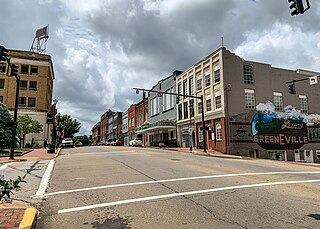
Greeneville is a town in and the county seat of Greene County, Tennessee, United States. The population as of the 2020 census was 15,479. The town was named in honor of Revolutionary War hero Nathanael Greene, and it is the second oldest town in Tennessee. It is the only town with this spelling in the United States, although there are numerous U.S. towns named Greenville. The town was the capital of the short-lived State of Franklin in the 18th-century history of East Tennessee.

East Tennessee is one of the three Grand Divisions of Tennessee defined in state law. Geographically and socioculturally distinct, it comprises approximately the eastern third of the U.S. state of Tennessee. East Tennessee consists of 33 counties, 30 located within the Eastern Time Zone and three counties in the Central Time Zone, namely Bledsoe, Cumberland, and Marion. East Tennessee is entirely located within the Appalachian Mountains, although the landforms range from densely forested 6,000-foot (1,800 m) mountains to broad river valleys. The region contains the major cities of Knoxville and Chattanooga, Tennessee's third and fourth largest cities, respectively, and the Tri-Cities, the state's sixth largest population center.

The United States District Court for the Western District of Tennessee is the federal district court covering the western part of the state of Tennessee. Appeals from the Western District of Tennessee are taken to the United States Court of Appeals for the Sixth Circuit.
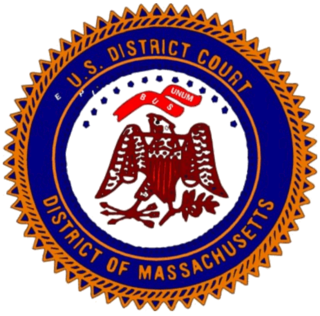
The United States District Court for the District of Massachusetts is the federal district court whose territorial jurisdiction is the Commonwealth of Massachusetts, United States. The first court session was held in Boston in 1789. The second term was held in Salem in 1790 and court session locations alternated between the two cities until 1813. That year, Boston became the court's permanent home. A western division was opened in Springfield in 1979 and a central division was opened in Worcester in 1987. The court's main building is the John Joseph Moakley Federal Courthouse on Fan Pier in South Boston.

Tusculum University is a private Presbyterian university with its main campus in Tusculum, Tennessee, United States. It is Tennessee's first university and the 28th-oldest operating college or university in the United States.
George Washington Bridges was an American politician and a member of the United States House of Representatives for the 3rd congressional district of Tennessee from 1861 to 1863. A Southern Unionist, he was arrested and jailed by Confederate authorities during the first few months of the Civil War in 1861. Though he eventually escaped, he did not take his seat in Congress until February 25, 1863, a few days before his term expired.

The American Civil War significantly affected Tennessee, with every county witnessing combat. It was a divided state, with the Eastern counties harboring pro-Union sentiment throughout the conflict, and it was the last state to officially secede from the Union, in protest of President Lincoln's April 15 Proclamation calling forth 75,000 members of state militias to suppress the rebellion. Although Tennessee provided a large number of troops for the Confederacy, it would also provide more soldiers for the Union Army than any other state within the Confederacy.
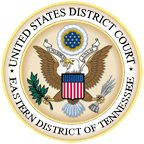
The United States District Court for the Eastern District of Tennessee is the federal court in the Sixth Circuit whose jurisdiction covers most of East Tennessee and a portion of Middle Tennessee. The court has jurisdiction over 41 counties with 4 divisions. Based in Knoxville, Tennessee, it maintains branch facilities in Chattanooga, Tennessee; Greeneville, Tennessee; and Winchester, Tennessee.

The East Tennessee Convention was an assembly of Southern Unionist delegates primarily from East Tennessee that met on three occasions during the Civil War. The Convention most notably declared the secessionist actions taken by the Tennessee state government on the eve of the war unconstitutional, and requested that East Tennessee, where Union support remained strong, be allowed to form a separate state that would remain part of the United States split from the rest of Confederate Tennessee. The state legislature denied this request, and the Confederate Army occupied the region in late 1861.

David McKendree Key was a United States senator from Tennessee, United States Postmaster General and a United States district judge of the United States District Court for the Eastern District of Tennessee and the United States District Court for the Middle District of Tennessee.

Harry Sandlin Mattice Jr. is a former United States district judge of the United States District Court for the Eastern District of Tennessee.
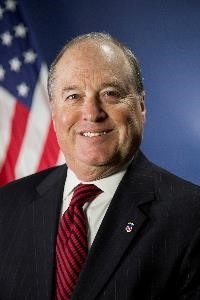
Doug Overbey is an American lawyer and former politician who served as the United States Attorney for the Eastern District of Tennessee from 2017 to 2021. Prior to becoming the U.S. Attorney, he represented District 2 in the Tennessee Senate as a Republican from 2009 to 2017. Overbey was chairman of the Senate Ethics Committee and vice-chairman of the Senate Judiciary Committee and the Senate Finance Committee. He is a senior partner and co-founder of the Robertson Overbey law firm and has served as an adjunct faculty member at the University of Tennessee College of Law. Prior to becoming a state senator, Overbey served in the Tennessee House of Representatives from 2000 to 2008. On February 8, 2021, he along with 55 other Trump-era attorneys were asked to resign.
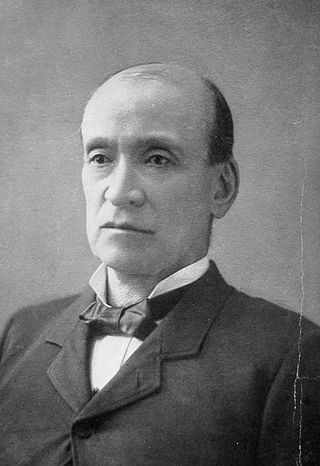
Oliver Perry Temple was an American attorney, author, judge, and economic promoter active primarily in East Tennessee in the latter half of the 19th century. During the months leading up to the Civil War, Temple played a pivotal role in organizing East Tennessee's Unionists. In June 1861, he drafted the final resolutions of the pro-Union East Tennessee Convention, and spent much of the first half of the war providing legal defense for Unionists who had been charged with treason by Confederate authorities.
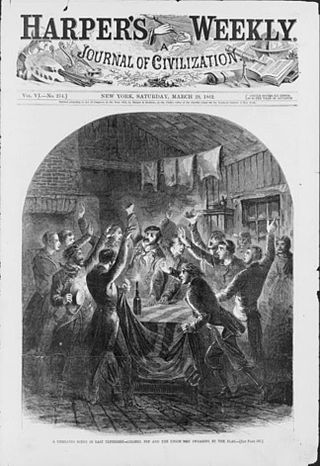
The East Tennessee bridge burnings were a series of guerrilla operations carried out during the American Civil War by Union sympathizers in Confederate-held East Tennessee in 1861. The operations, planned by Carter County minister William B. Carter (1820–1902) and authorized by President Abraham Lincoln, called for the destruction of nine strategic railroad bridges, followed by an invasion of the area by Union Army forces then in southeastern Kentucky. The conspirators managed to destroy five of the nine targeted bridges, but the Union Army failed to move, and would not invade East Tennessee until 1863, nearly two years after the incident.
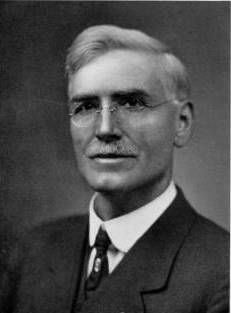
Hugh Barton Lindsay was an American attorney, jurist and politician in Tennessee, who was appointed as United States Attorney for the Eastern District, serving from 1889 to 1893, and judge of Tennessee's Second Chancery District from 1894 to 1899. He was the Republican nominee for Governor of Tennessee in 1918, losing to Albert H. Roberts, as well as the Republican nominee for United States Senator in 1924, losing to Lawrence Tyson. As an attorney, Lindsay helped ALCOA become established as an industry in the region in the 1910s. He also helped launch the movement in the 1920s to create and preserve Great Smoky Mountains National Park.
Samuel Ramsey Rodgers was an American attorney, judge and politician, who served as Speaker of the Tennessee Senate during the months following the Civil War. He oversaw the passage of several important pieces of legislation in the senate, including the state's ratification of the Thirteenth Amendment to the U.S. Constitution. Rodgers remained loyal to the Union during the war, and chaired the convention that reorganized the state government in January 1865.

James William Deaderick was an American attorney who served as chief justice of the Tennessee Supreme Court from 1876 to 1886. Prior to becoming Chief Justice, he was an associate justice of the court, having been elected to the bench in 1870 after the enaction of the new state constitution. He had previously served one term in the Tennessee Senate (1851–1853), and campaigned as an elector for presidential candidate John Bell in 1860.
Richard Mitchell Edwards was an American attorney, politician and soldier who served one term in the Tennessee House of Representatives (1861–1862). A Southern Unionist, he represented Bradley County at the East Tennessee Convention in 1861, and served as colonel of the 4th Tennessee Cavalry of the Union Army during the Civil War. He ran unsuccessfully for governor on the Greenback Party ticket in 1878 and 1880.
Daniel Coffee Trewhitt was an American attorney, judge, and politician. He served one term (1859–1861) in the Tennessee House of Representatives, where he was one of the few state legislators to oppose secession on the eve of the Civil War. He represented Hamilton County at the pro-Union East Tennessee Convention, and afterward fought for the Union Army. He served as judge of the state's second chancery division from 1864 to 1870, and judge of the state's fourth circuit court from 1878 to 1891.

The Grand Lodge of Tennessee, officially the Grand Lodge of the Ancient and Honorable Fraternity of Free and Accepted Masons of the State of Tennessee, is the main governing body of Freemasonry within Tennessee. This Grand Lodge was established in Knoxville, Tennessee, on December 27, 1813, by nine Masonic lodges operating within the state. In 2017, the Grand Lodge of Tennessee had a reported membership of 34,858 Master Masons, and by 2020 the membership had fallen only slightly to 33,200.
References
- ↑ About the District, U.S. Attorney's Office, Eastern District of Tennessee. Retrieved: 1 February 2013.
- ↑ The Bicentennial Celebration of the United States Archived 2010-12-05 at the Wayback Machine , U.S. Department of Justice Document Set 16, 1994. Retrieved: 1 February 2013.
- 1 2 "Sandy Mattice to Get Appointment as U.S. Attorney," The Chattanoogan.com, 2 August 2001. Retrieved: 1 February 2013.
- 1 2 "Retiring U.S. Attorney Earns Praise for Implementing Task Forces," Knoxville News Sentinel, 27 June 2010. Retrieved: 1 February 2013.
- ↑ "Nancy Stallard Harr Sworn in as U.S. Attorney for the Eastern District Of Tennessee". www.justice.gov. 2016-10-28. Retrieved 2021-04-23.